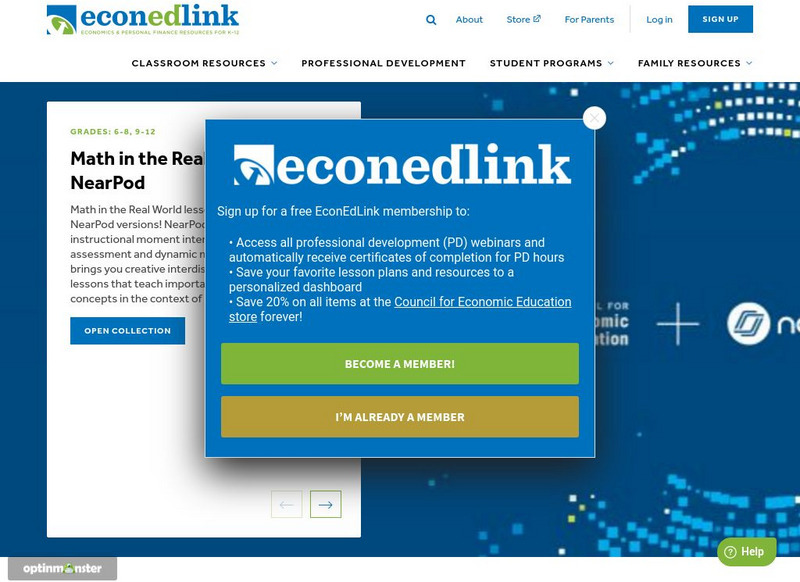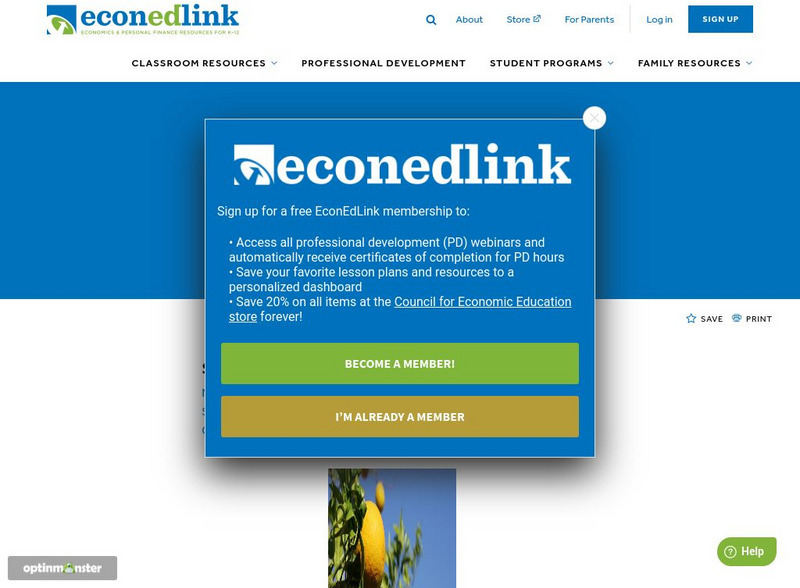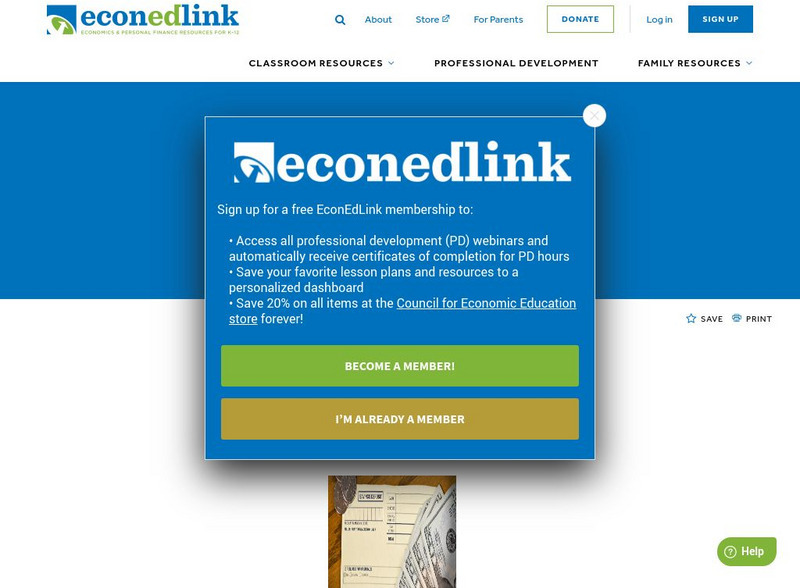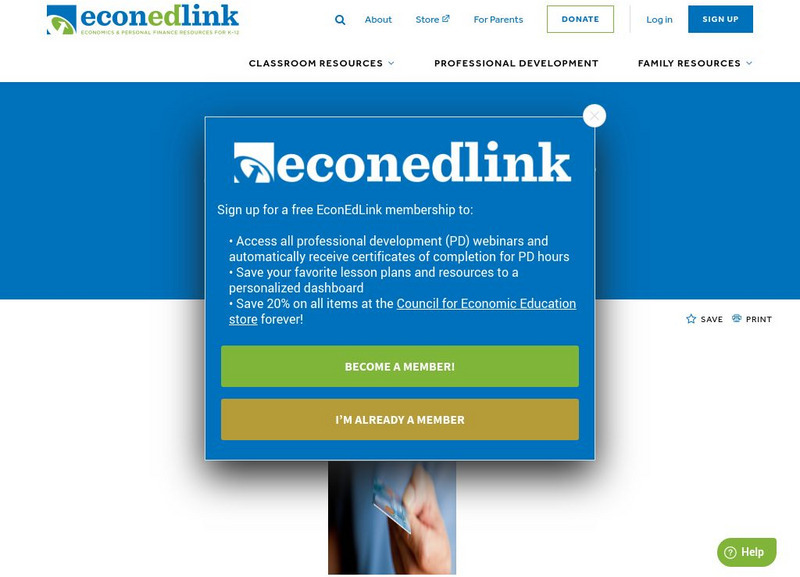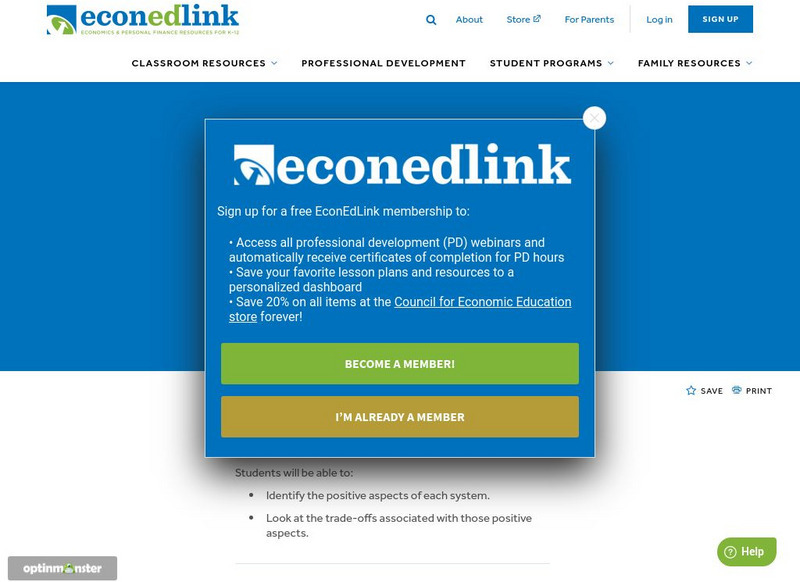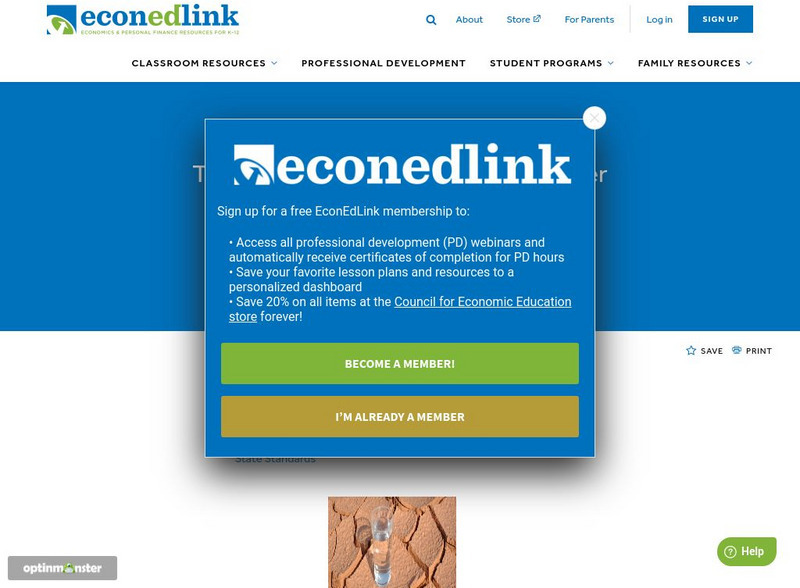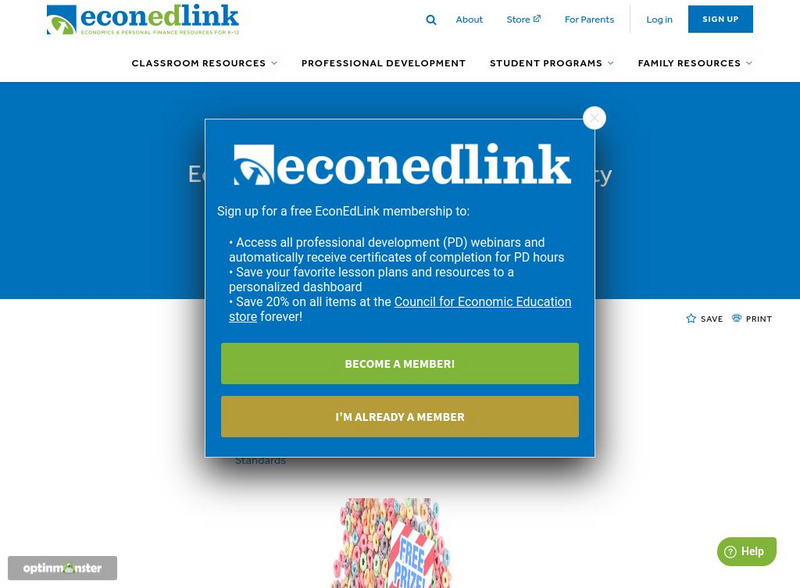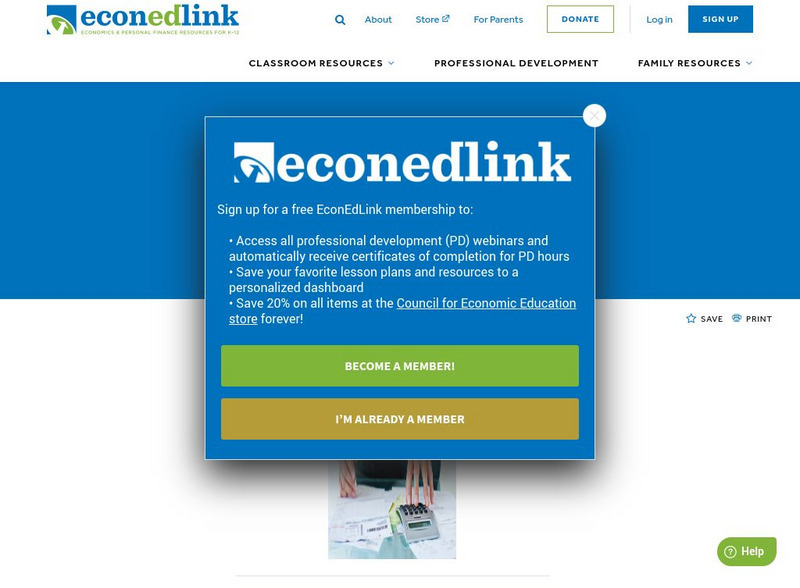Council for Economic Education
Econ Ed Link: Econ Ed Link Collection
Use this collection of economic education lessons for K-12 teachers and students to improve financial literacy. One interesting feature is "This Day In Economic History," a calendar which identifies an interesting event for each day,...
Council for Economic Education
Econ Ed Link: Clean Land Thanks to Us! (Student Page)
How does the government raise money to fund government agencies like the EPA? Through taxes. This lesson looks at the different taxes that are paid by US citizens and how the money is used for things such as cleaning up the environment.
Council for Economic Education
Econ Ed Link: Where Did You Come From?
This site is an excellent lesson plan in which students explore the economic interdependence shared between the United States and Chile. Students will learn about the products imported from Chile and determine the reasons for trade...
Council for Economic Education
Econ Ed Link: National Budget Simulation
How would you deal with the national budget if you were the President of the United States? What if there was a national emergency? This site includes a budget simulation on the computer that allows students to make real budget...
Council for Economic Education
Econ Ed Link: Unemployment in My Hometown
For this lesson plan, students interpret data tables from the Bureau of Labor Statistics to compare national and local unemployment data.
Council for Economic Education
Econ Ed Link: Money Doesn't Grow on Trees
This lesson plan helps students distinguish between earned and unearned income by identifying methods for getting money.
Council for Economic Education
Econ Ed Link: Banks, Bankers, Banking
This instructional activity is a simulation of opening a bank. Learners are assigned various roles to play within the banking business. Students learn about the role banks play in a market economy.
Council for Economic Education
Econ Ed Link: My Credit Rating: Why Should I Care?
This site provides an interesting instructional activity on credit and how we use it, the dangers of over-using it, bankruptcy and its consequences, and more.
Council for Economic Education
Econ Ed Link: Car Loan Project
This lesson takes students through the process of buying a car. A great real-life application that helps introduce students to all of the nuances associated with purchasing a car, such as interest rates, loan applications, and amortization.
Council for Economic Education
Econ Ed Link: The Price We Pay for Health: Us and Canada
This lesson plan focuses on the rising cost of healthcare in the United States. The objective of the lesson is to compare and contrast the health care systems in the United States and Canada.
Council for Economic Education
Econ Ed Link: Ncee: Tapped Dry: How Do You Solve a Water Shortage?
Water is a limited and sometimes scarce resource. What do you do when the supply is limited?
Council for Economic Education
Econ Ed Link: The Entrepreneur in You
This website is a valuable resource in finding out more about being an entrepreneur. It contains a comprehensive lesson plan detailing what it takes to be an entrepreneur.
Council for Economic Education
Econ Ed Link: The Mystery of the Voters Who Don't Vote
This lesson plan from the Council for Economic Education for students, grades 9-12, examines the question of why many Americans don't vote. It interestingly ties the answer to some economic terms such as choice, cost/benefit analysis,...
Council for Economic Education
Econ Ed Link: The Role of Gov. National Debt v. Deficit
Using the website federalbudget.com, learners research information about the federal budget. Includes questions and links to other budget websites.
Council for Economic Education
Econ Ed Link: Us and Eu Go Bananas Over Trade
Economists generally agree that free trade helps to improve the overall quality of life in countries that participate. However, disagreements do arise concerning trade agreements. This lesson looks at a disagreement between the US and EU...
Council for Economic Education
Econ Ed Link: The 411 on College Education
What are the costs and benefits to getting a college degree? Use this lesson plan to get your students thinking about the options they have for higher education and how to pay for it.
Council for Economic Education
Econ Ed Link: Current Events in the Economy
Organization provides tested, economic lessons from current economic news and information.
Council for Economic Education
Econ Ed Link: Babysitter Shortage in Washington, d.c.
What is responsible for the shortage of babysitters in Washington, DC? Identify the parts of the article which indicate a decrease in supply and an increase in demand.
Council for Economic Education
Econ Ed Link: The Euro Makes Its Debut
On Jan. 1, 1999 11 European countries united in the European Monetary Union. The new single currency bloc includes almost 300 million consumers and creates the second-largest economy in the world. How will this new union affect the...
Council for Economic Education
Econ Ed Link: Economic Incentives in Our Community
Learners will identify positive and negative economic incentives used in their communities to encourage people to make CHOICES beneficial to the community. Students will recognize that not all incentives convince all people since people...
Council for Economic Education
Econ Ed Link: Money Comes and Goes
Learners read two online stories that introduce them to the elements of a budget and show that a successful budget balances money coming in (income) with money going out (expenses and savings). Follow-up activities point out the value of...
Council for Economic Education
Econ Ed Link: Be All You Can Be for Minimum Wage? (Educator Page)
This lesson ask students to calculate the percentage change in military strength over the last two decades, hypothesize economic (and non-economic) explanations for these changes, test hypothetical explanations by reading an economic...
Council for Economic Education
Econ Ed Link: Inflation Data: Is the Economy Healthy? (Grades 9 12)
This lesson asks students to identify sources for macroeconomic data, interpret data, describe the present state of the economy using current data, and use data to predict the state of the economy one year from now.
Council for Economic Education
Econ Ed Link: Are the Best Things in Life Free?
Learners use economic reasoning to analyze the costs and consequences of choice. The idea that the best things in life are free is widely expressed as a maxim by people who know nothing of its origin. They know it's true through...


